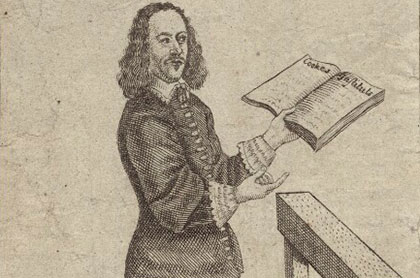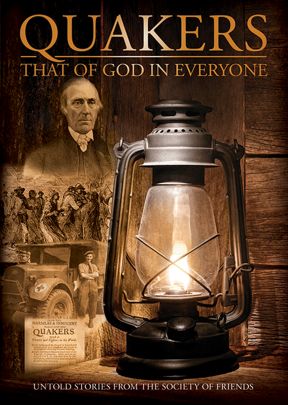
[ABOVE—John Lilburne, after Unknown artist line engraving, mid 17th century 6 1/4 in. x 3 1/2 in. (158 mm x 88 mm) paper size; Given by the daughter of compiler William Fleming MD, Mary Elizabeth Stopford (née Fleming), 1931. NPG D28981 [CC BY-SA 3.0 http://creativecommons.org/licenses/by-nc-nd/3.0/]]
The Englishman John Lilburne was for many years a Puritan. He took the side of Parliament in the English Civil War and fought well for the cause, especially at Maston Moor in 1644. At that time he was a close associate and friend of Oliver Cromwell. Later Cromwell imprisoned him because of his opposition to the Protector’s tyranny. During this imprisonment, Lilburne became a Quaker, claiming that for the first time he developed a real relationship with God.
Quakers—That of God in Everyone.Though many are familiar with the Quaker names such as William Penn, Susan B. Anthony, Daniel Boone, and Johns Hopkins, lesser-known Quakers also impacted society in significant ways. These are untold stories Friends who profoundly influenced the course of American history by seeing that of God in everyone.
It is wonderful how God changes history through people who don’t seem completely glued together. Lilburne’s writing was sometimes half-incoherent and ranting. Yet he has a significant place in the history of personal rights in England and those countries, such as the United States, which derive their understanding of law from it. He claimed every Englishman was born with rights (rights not given by any government, but rather innate human rights) and he agitated for them. Eminent authorities, such as Chief Justice Hugo Black, have cited Lilburne’s arguments as foundational to the United States Constitution.
Here is one of the clearer excerpts from his spiritual testimony, written while he was in prison. The wording and spelling are somewhat modernized to make it more readable.
The Resurrection of John Lilburne, Now a Prisoner in Dover Castle.
From Dover Castle, being a place wherein God has more clearly than ever before, opened the eyes of my understanding, the 4th day of the 10th month, 1655.
[Lilburne explains at length why he did not sign an “engagement” demanded by Cromwell; what Christ is to his soul, how he has overcome fleshly desires, what God and Satan desire of us, spiritual warfare, and the like with many scriptural allusions and quotations]
In all which consideration, I say, I have now the faithful and true witness in my soul, that the Lord himself is become within me the teacher of my soul, and enabler of me to walk in a measure of his pure ways and paths; yes, and so clear a teacher within me, is he already become unto me, as that I with confidence believe my inward teacher shall, never now more be removed into a corner; but is, and shall be as a continual voice speaking in my ears; “This is the way, walk in it:” By which divine teaching I am now daily taught to die to sin, and led up by it into living power, to be raised up, and enabled to live in a pure measure of righteousness; and by which inward spiritual teachings, I am, I say again, led up into power in Christ, by which I particularly can, and do hereby witness, that I am already dead, or crucified, to the very occasions, and real grounds of all outward wars, and carnal sword-fightings and fleshly bustlings and contests; and that therefore I confidently now believe, I shall never hereafter be a user of a temporal sword more, nor a joiner with those that so do.
And this I do … solemnly declare, nor in the least to my old persecution, or for any politic … of my own or in the least for the satisfaction of the … wills of any of my great adversaries, or for satisfying the carnal will of my poor weak, afflicted wife, but by the special movings and compulsions of God now upon my soul, am I in truth and righteousness compelled this to declare, that so I may take away from my adversaries all their fig-leaf covers, or pretences of their continuing of my everyway unjust bonds; And thereby, if yet I must be an imprisoned sufferer, it may from this day forward be for the truth, as it is in Jesus: Which truth I witness to be truly professed and practiced by the savoriest of people called Quakers: and to this my present declaration, which I exceedingly long and earnestly desire to have in print, and for which I know that I can cheerfully and assuredly lay down my life, if I be called to witness the truth of it, I subscribe my outward name,
JOHN LILBURN,
the new, or inward
spiritual name, no
man knows but he
that has it.From my innocent, and every way causeless captivity in Dover-Castle, the place of my soul’s delightful and contentful abode, where I have really and substantially found that which my soul many years has fought diligently after, and with unsatisfied longingness, thirsted to enjoy, this present first day of the week, being the 4th of the 3rd month, 1655.
The End

